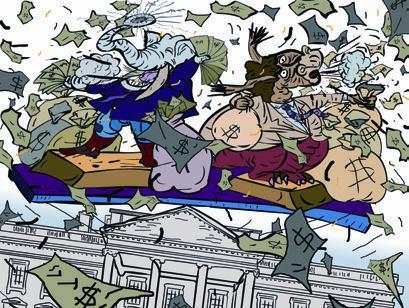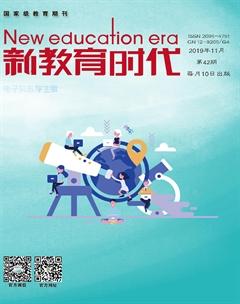Systemic Dysfunction

In December 2019, the China Society for Human Rights Studies, a leading Chines e NGO, issued a document, Money Politics Exposes the Hypocrisy of “U.S.-Style Democracy,” which said the sharp divisions in U.S. politics and society prevent a large number of citizens from participating in political affairs. The main reason for this is money politics, which is depriving people of their democratic rights. This is an edited excerpt from the document:
“Money is the mothers milk of politics.” This comment reveals the essence of contemporary U.S. politics. Money politics runs through all aspects of U.S. elections, legislation and governance, and has become a persistent disease in U.S. society.
Money for power
Elections, whose original purpose is to express the will of the voters, determine the political direction, and choose qualifi ed leaders, have been reduced to money games. Raising funds is a prerequisite for a candidate to run in an election at any level. Without enough money, it is simply impossible to compete for any important political position.
The election costs of the Republican and Democratic presidential candidates have increased rapidly from $700 million in 2004 to $1 billion in 2008 and $2 billion in 2012. In 2016, U.S. elections, including presidential and congressional elections, cost $6.6 billion, making them the most expensive political elections in U.S. history.
The cost of U.S. midterm elections has also risen rapidly. In the 2018 midterm election, the average cost of winning a Senate seat was $19.4 million, and the average cost of winning a House seat exceeded $1.5 million. The high expenses have greatly raised the threshold for election participation and eliminated the possibility of the vast majority of people participating.
The U.S. is a capitalist country, and U.S. democracy is a political form through which the bourgeois rules. The U.S. has designed a sophisticated political and electoral system to screen candidates and voters at various levels to ensure that only those who satisfy the needs of the rich people are elected.
Initially, the U.S. imposed restrictions on voter eligibility, depriving large numbers of citizens (such as those from racial minority groups and women) of the right to vote. Later, money became the most important means to control elections.
In the 20th century, especially after the 1960s, with the popularity and development of the mass media, the status of money in elections continued to rise. Money eliminates political participants from the bottom of society by making it difficult for the representatives of the poor to become candidates. The rich choose their political agents and make them candidates and win elections by funding campaigns.
Due to this system design, the connection between economic interests and political power is naturally close. By participating in political elections, the rich acquire political guarantees for their economic interests.
The activities of interest groups vividly explain the connotation of money politics. Their purpose is to participate in the power operation process and induce public power departments to formulate policies to safeguard and expand their interests. Interest groups have struck deep roots in U.S. administration, Congress, and the judicial system. With political parties and governments they have become the three pillars of U.S. politics.
There are many ways for interest groups to operate. They can affect congressional legislation and future government decisions by providing funds, directly participating in the election process and helping certain candidates win elections. They can create public opinion and influence government decision-making by advertising, giving radio and television speeches, holding press conferences and producing movies. And they can exert a direct infl uence on government decisions by lobbying legislators and decision-makers.
Decisions of the U.S. Government and congressional legislation are often the result of the competition among different interest groups.
Interest groups are a typical example of money politics. Their activities are the “hub”that connects money and power, and their function is to convert money into political influence. With more abundant funds, an interest group will enjoy greater political influence, and most of the money is in the hands of the rich. The poor can also form their own interest groups, but due to limited financial resources, such groups can never exert much infl uence.
Lobbying is an important way to implement money politics. Over the past 40-odd years, the lobbying industry in the United States has shown explosive growth. In 1971, there were only 175 registered lobbyists but the number increased to 2,500 in 1981 and to 13,700 in 2009. This means that on average, each member of the U.S. Congress, both the House of Representatives and the Senate, is lobbied by more than 20 lobbyists.
Loosening restrictions
In the late 19th century, U.S. money politics developed into a “pork-barreling” political system. The party that wins the competition usually gives offi cial positions to those who have contributed to the election campaign, mainly the backbone of the party and those who provided campaign funds. Pork barreling has led to corruption in the political sector and among offi cials, and decreased administrative effi ciency.
Since the beginning of the 20th century, the United States has tried to impose some restrictions on political contributions, but it has never changed the nature of U.S. democracy, which is money politics. The “super-fundraiser”system can legally avoid donation limits. A super fundraiser is someone who has a lot of wealth and social connections, such as corporate executives, hedge fund managers, showbiz stars or lobbyists. They are able to use their personal networks to bring together a large number of small donors to raise a lot of funds for a candidate within a short period of time.
Under the super-fundraiser system, a big personal donation that surpasses the limit can be divided into smaller parts that are under the limit and put under other peoples names. That is how big donations become legalized. This makes it easy for the affl uent and large enterprises to trade money for political infl uence.
Super political action committees (PACs) are the most important manifestation of money politics. A PAC is a political committee consisting of corporations and independent political groups, organized to raise political donations and circumvent the limits on personal and corporate donations imposed by regulations.

A PAC collects money from many individuals and then decides on the candidates to donate to. As it is closely related to certain large corporations and specifi c interest groups, a PAC often launches publicity campaigns to support or oppose a certain candidate and participates in elections on behalf of these corporations and interest groups. Corporations and the wealthy can inject their funds into super PACs without restrictions to indirectly affect an election.
Serious consequences
First, money politics deprives ordinary people of their political rights. Although the United States often shows off its “one person, one vote” democracy, the reality is that the voting right of low-income citizens is severely restricted.
According to a Newsweek report on its website on November 21, 2017, thousands of U.S. citizens have been deprived of their voting right because of poverty. Nine states have passed legislation stripping citizens in arrears with attorney fees or court fi nes of the right to vote.
In Alabama alone, more than 100,000 U.S. citizens in arrears were removed from the voter list, accounting for approximately 3 percent of the states voter population, leading to a lower turnout in elections. The turnout rate slumped to its lowest level since the 1940s during the 2014 U.S. midterm election, when the national average turnout rate was only 37 percent.
Second, government posts have become exclusive to the rich and the upper class. According to U.S. political practice, after winning an election, the elected candidate usually rewards those who have made significant contributions to the election campaign, such as major donors and fundraisers, with government posts.
After the 2000 presidential election, one third of the new positions in the government were taken over by relatives, friends and major donors of the winning presidential candidate. Among the 556 super-fundraisers who supported the winning candidate in the 2008 presidential election campaign, one third obtained government posts or became consultants in the administration.
Third, money politics is blatantly delivering benefi ts to the rich. A negative consequence of political contributions is that the rich, who are fewer in number, have greater influence than the vast majority, leading to the formulation of government policies that benefit the rich and harm the interests of the poor.
It is a well-known fact that the Republican administration that took offi ce in 2017 is an administration representing the rich. The Federal Unemployment Tax Act (FUTA) adopted by the Congress in 2017 claimed to reduce taxes, but it was not aimed to carry out an across-theboard tax cut. The FUTA has reduced taxes only for the rich and large corporations. It has even increased taxes for the poor.
Fourth, money politics makes it more diffi -cult for the U.S. to solve its pressing political and social problems like the proliferation of guns and gun violence.
Interest groups such as the National Rifle Association of America (NRA) that oppose gun control have successfully disrupted governmental gun control efforts by participating in elections and lobbying. They have made signifi -cant political contributions to the presidential and congressional elections. Due to the large amount of money they have invested, the antigun control interest groups represented by the NRA have thwarted nearly all gun control bills.
In the United States, where money governs politics, political participation and discussions can never be actualized without the help of money. Money politics has ruthlessly crushed democracy.

